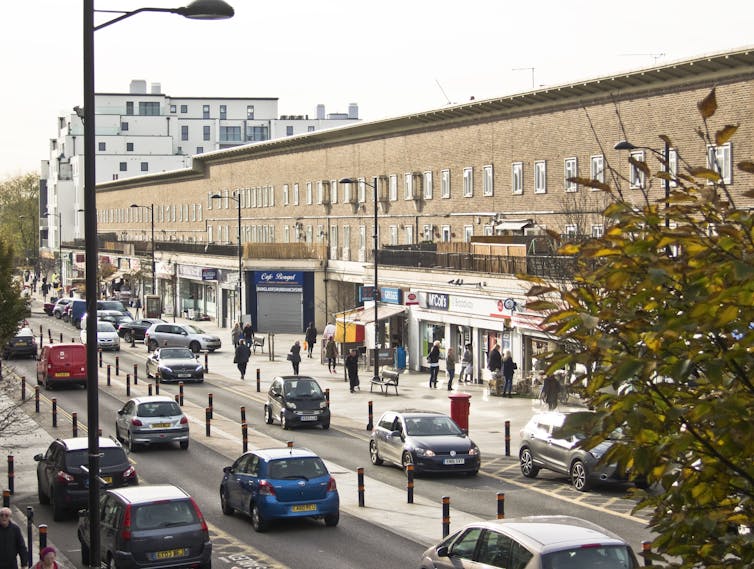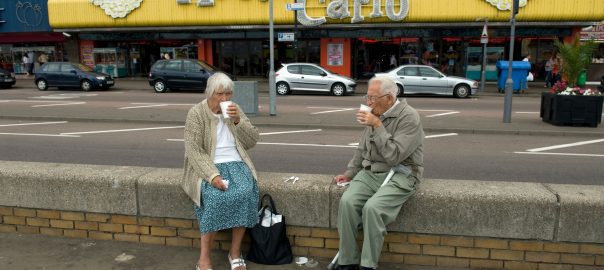Amanda Cole, University of Essex
As English dialects go, cockney is one of the most influential. Long considered the preserve of working-class communities in east London, it has shaped the way people speak across the country, from Reading, Milton Keynes and even Hull all the way to Glasgow.
Even Queen Elizabeth II, throughout her lifetime, began to speak in a way that was, well, a little bit less Queen’s English and a little bit more cockney. Compared to the 1950s, by the 1980s the way she said “goose”, “food” or “moon”, for instance, had changed subtly. Her later pronunciation, with the tongue a little bit further forward in the mouth, was in line with the general patterns of change in southern England.
As is often caricatured, due to patterns of migration and settlement, the way vowels are pronounced in Australia and New Zealand has some notable similarities with cockney. Similarly to cockney, the Australian take on the word “bake” sounds, to many British ears, more like the word “bike”, which has the potential to cause some confusion.
Cockney might thus have spread around the world, but research published in 2011 found that in east London, young people increasingly speak multicultural London English, a different dialect, which includes elements of both cockney and other languages and English dialects from around the world.
These findings led many to suggest that cockney was on the way out. But, cockney certainly didn’t feel dead to me.
Throughout my childhood, where I lived – a stone’s throw from east London on a red-brick estate in Essex – my granddad nattered away in rhyming slang. We sang rounds of cockney ding dongs (songs) such as Knees up Mother Brown, and our local pie and mash shop thrived.
In my newly published research, I have shown that cockney hasn’t disappeared – it just moved to a semi-detached house in Essex. Cockney’s descendants in Essex have kept the foundations the same, but they’ve knocked through some walls, built an extension and added a lick of paint. The Essex dialect is built on the foundations of cockney with some new elements.
Why east Londoners moved to Essex
Over the 20th century, more than a million people left east London, due to, among other things, de-industrialisation, overcrowding and poverty. My grandparents, and through them my great-grandparents, recounted tales of biting poverty growing up in east London.
They spoke of having to eat their pet rabbits in desperation, suffering from drawn-out illnesses without medical intervention or diagnoses and relying on food donated by the local church. My parents were the first generation in my family to not have their teeth pulled out, at the age of 21 and often with pliers at the butchers, to avoid the cost of future dental treatment.
The government set up programmes to relocate families to new-build towns and council estates in the London peripheries. My four grandparents moved in the early 1950s and 1970s to fully modernised, semi-detached houses on council estates in southern Essex.
My father’s family moved to the Debden Estate, now often referred to as simply “Debden”. This is where my sister and I were raised, too.
To find out if the cockney dialect moved out of east London along with its speakers, I drew up a long list of all the different linguistic elements of cockney or London dialects that were mentioned in 20th-century and early 21st-century publications.
These included pronouncing “thing” as “fing”; not pronouncing the “h” in “house”; pronouncing the “l” in words like “milk” as a vowel sound so that it sounds like “miwk”; saying “theirselves” and “hisself” instead of “themselves” and “himself”; saying “ink” instead of “ing” in words like “something” and “nothing”, so they’d become “somefink” and “nofink”; and, unlike many other dialects of English, not saying “board” and “bored” identically.

Richard Cole, CC BY-SA
I then interviewed the first generation who, like my dad, grew up in Debden after their parents were relocated from east London in the late 1940s and 1950s. I found that those who grew up in Essex overwhelmingly still used nearly all these elements of cockney.
In some instances, theirs is an even more extreme version of cockney than that previously documented in London. For instance, as mentioned, it has long been known that cockneys say “l” as “w” in many words.
However, it was previously thought that cockneys do indeed pronounce the “l” (and don’t say “w”) when it occurs between two vowels such as in the phrase “pass the ball over here”. In Debden, I found that even in such phrases, the “l” could be pronounced as a “w” sound.
Generational differences
Interestingly though, people don’t always call the way of speaking in Debden “cockney”. I have found that those born in Essex, particularly younger generations, tend to consider their accent to be an “Essex” one. By contrast, the older generations born in east London are much more likely to consider their accent to be a “cockney” one.
Our identity and the geographic boundaries within which we live impact the way we speak and how we define our own accent. Research has found that the way people speak in the town of Middlesbrough, say, has fluctuated over time in line with the repeated redrawing of local administrative boundaries, and the town being considered variously part of Yorkshire, Teeside or Cleveland.
Even people who aren’t from Essex have changed the way they perceive and judge an Essex accent in line with the arrival of ockneys to the county. My previous research showed how the stigma and negative stereotypes previously associated with cockney have come to be associated with Essex. On average, people with Essex accents are judged to sound less intelligent, friendly and trustworthy than people from other parts of south-east England.
Not only has people’s sense of identity changed in Debden but, as all dialects inevitably do, the cockney dialect has changed on Essex soil. Younger people in Essex speak slightly differently to their east London-raised elders.
They are less likely to drop an “h” or say “anyfink”. And their vowels are less extreme. “Mouth” is slightly less likely to become “mahf”. They also say new things that are much less common among their London-raised parents and grandparents such as “at the end of the day” when introducing the most important point in a discussion. And saying “yous” when referring to more than one person.
The cockney dialect has lived a rich and colourful life. She has travelled widely, borne a large family of children, grandchildren, nieces and nephews, and she even met the queen. She hasn’t died – she’s just called “Essex” now.
Amanda Cole, Lecturer in Department of Language and Linguistics, University of Essex
This article is republished from The Conversation under a Creative Commons license. Read the original article.

